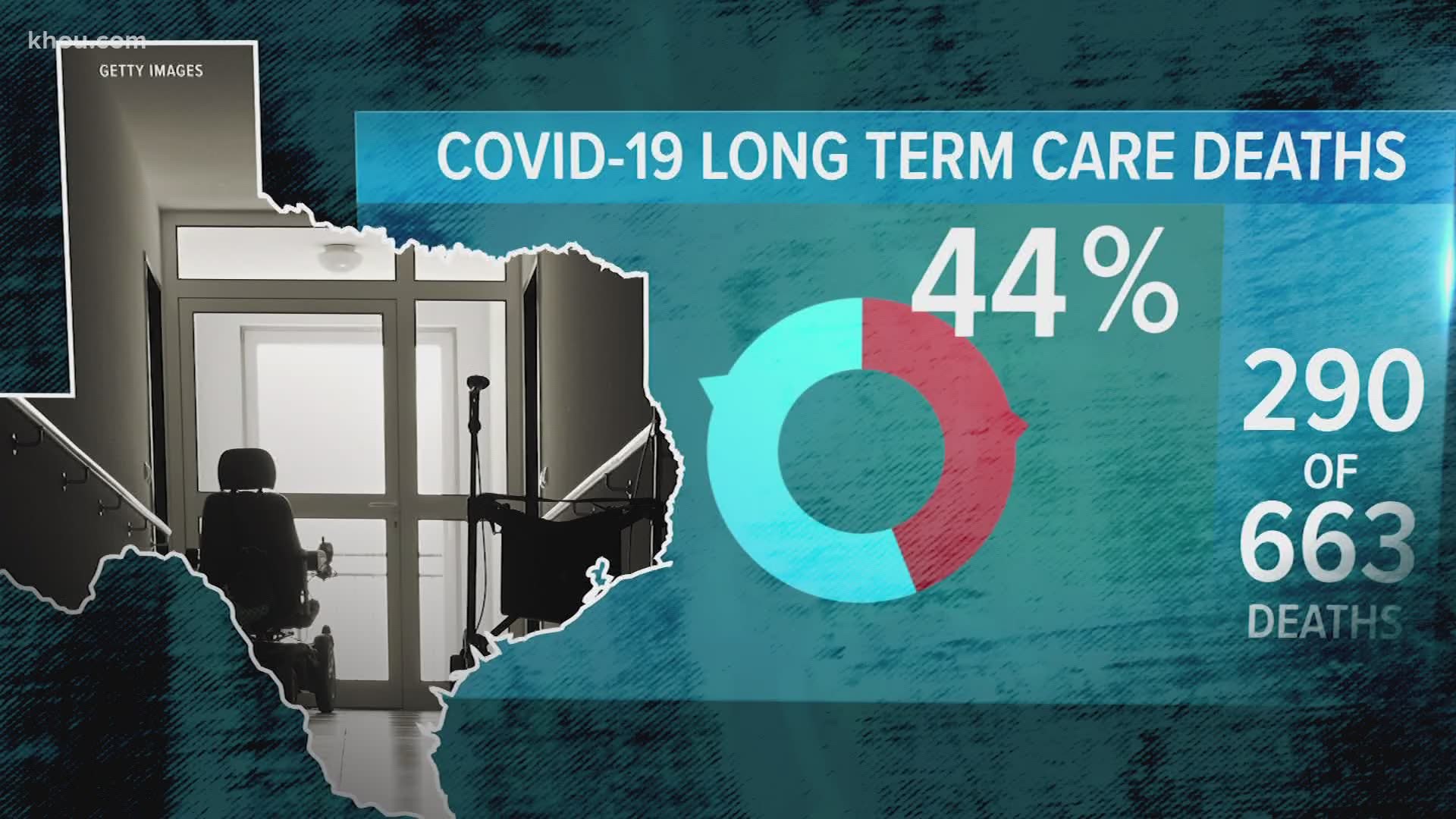HOUSTON — One of the latest battle plans in the coronavirus war focuses on long-term care facilities as nearly half of all COVID-19 deaths in Texas are now related to a nursing home or assisted living facility.
The Texas Health and Human Services Commission confirms it has received reports of 231 resident coronavirus deaths related to nursing homes and another 59 deaths related to assisted living facilities. The combined 290 represents 44 percent of the state’s 663 total COVID-19 deaths.
RELATED: Harris County creates COVID-19 Strike Team to bring testing materials to nursing homes, shelters
With the rise in numbers comes a major push by local, county and state authorities to protect the most vulnerable in long-term care. Harris County Judge Lina Hidalgo announced the formation of a “strike force” Monday that will be providing testing kits they can take directly on site at nursing homes or senior living centers where residents may not have the means to get tested at drive-thru locations. Hidalgo said the team of epidemiologists and other public health personnel will begin to go to one nursing home a day starting Tuesday.
“The more we're able to do this, the better we'll be able to choke off the virus, stop it in its tracks and move forward,” Hidalgo said.
“We have to do everything we can to continue to protect those who are most at risk,” added Dr. Umair Shah with the Harris County Public Health Department.
The Houston Health Department is on the offensive, too, making house calls to approximately 300 facilities to educate them on screening and infection control. The agency drafted Houston firefighters to help with reinforcements.
“Because simply that’s a large number of locations to visit and we needed a bigger army to do it,” said Dr. David Persse with the Houston Health Department.
Harris County health officials confirmed seven coronavirus deaths related to long-term care facilities, 13 percent of the county’s overall death toll. The Houston Health Department did not have long-term care death totals as of publication.
Other counties report far higher numbers. In Washington County, 11 of the 13 total COVID-19 deaths are related to long-term care facilities. In Galveston County, it’s 20 of 22 overall deaths or 91 percent.
“We spent the time educating them, we spent the time walking them through procedures,” said Dr. Philip Keiser with the Galveston County Health District.
“We’ve had a real hard time despite all of our best efforts from keeping it from spreading once it’s gotten into those particular homes,” Dr. Keiser said.
In the Governor’s Report to Open Texas, Greg Abbott outlined a comprehensive mitigation plan to protect elderly Texans and prevent the further spread of the virus. The recommendations include quantifying the extent of infection immediately, appropriate isolation of positive cases, and enhancing infection control standards. The governor’s plan also features a Rapid Assessment Quick Response Force and a medical triage team that can be deployed to perform testing of residents and staff and help with other immediate needs of a facility.
Coronavirus symptoms
The symptoms of coronavirus can be similar to the flu or a bad cold. Symptoms include a fever, cough and shortness of breath, according to the Centers for Disease Control. Some patients also have nausea, body aches, headaches and stomach issues. Losing your sense of taste and/or smell can also be an early warning sign.
Most healthy people will have mild symptoms. A study of more than 72,000 patients by the Centers for Disease Control in China showed 80 percent of the cases there were mild.
But infections can cause pneumonia, severe acute respiratory syndrome, kidney failure and even death, according to the World Health Organization. Older people with underlying health conditions are most at risk for becoming seriously ill. However, U.S. experts are seeing a significant number of younger people being hospitalized, including some in ICU.
The CDC believes symptoms may appear anywhere from two to 14 days after being exposed.
Human coronaviruses are usually spread through...
- The air by coughing or sneezing
- Close personal contact, such as touching or shaking hands
- Touching an object or surface with the virus on it, then touching your mouth, nose or eyes before washing your hands.
Help stop the spread of coronavirus
- Stay home when you are sick.
- Eat and sleep separately from your family members
- Use different utensils and dishes
- Cover your cough or sneeze with your arm, not your hand.
- If you use a tissue, throw it in the trash.
- Follow social distancing
Lower your risk
- Wash your hands often with soap and water for at least 20 seconds. If soap and water are not available, use an alcohol-based hand sanitizer.
- Avoid touching your eyes, nose, and mouth with unwashed hands.
- Avoid close contact with people who are sick.
- Clean and disinfect frequently touched objects and surfaces.
- If you are 60 or over and have an underlying health condition such as cardiovascular disease, diabetes or respiratory illnesses like asthma or COPD, the World Health Organization advises you to try to avoid crowds or places where you might interact with people who are sick.
Get complete coverage of the coronavirus by texting 'FACTS' to 713-526-1111.

